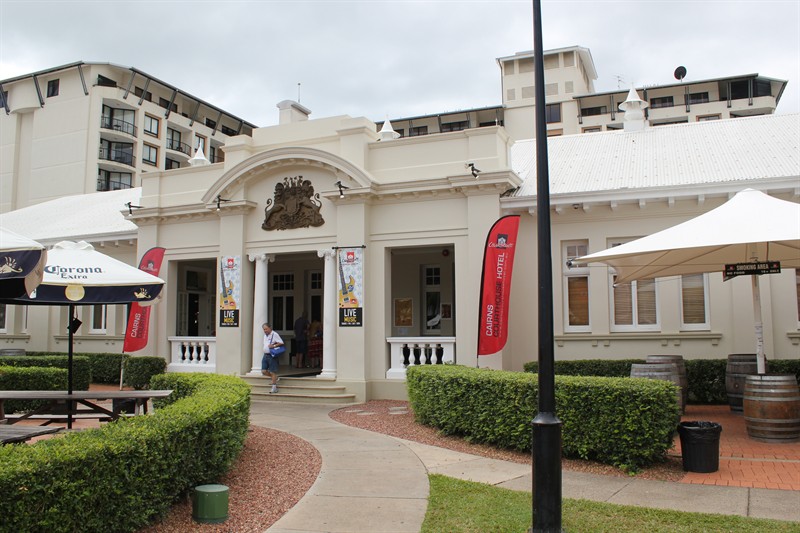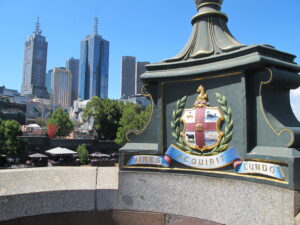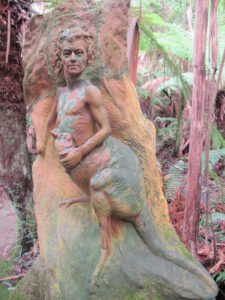
Most inveterate travelers will tell you that meeting interesting people can prove a more memorable part of travel than the amazing sights of the world. We recently shared an evening in Cairns with one surprising – and enlightening – group.
We were in town for one night. The next day we were heading to Fitzroy Island, which abuts the Great Barrier Reef of Australia, for some snorkeling and diving. We had chosen a dinner spot unwisely, a noisy Irish pub nearby that served up perhaps the worst meal we had ever had. Now we just wanted to unwind a bit. The stately pillars of the venerable Courthouse Hotel beckoned to us.
The loud indoor bar seemed a lot less inviting than the outdoor patio, so we went out back to find shelter under its canopy of umbrellas while the rain drifted in and out. As we approached the deck, a chair suddenly flew past us. It had come from a 35-40ish burly six footer, now lurching near a table with one of several boisterous groups out there. We passed him, acknowledging his throw with a smile, and heard his brief explanation that the chair was really bugging him. OK, we thought, maybe we won’t stay back here too long.
We sat at a beer barrel table just a few barrels away from the group. Soon the chair tosser came over to say hello, a bit apologetic for his rough introduction. It turned out he was chief of a boat crew off work for a few days. Their job was to offload fishing catch from trawlers far out at sea so the fishermen don’t have to waste time bringing the catch to shore, and also to supply fuel to keep them going. He acted/talked pretty much like what you would expect of a longshoreman. And he was already pretty “pissed” from Corona beer which kept emerging, “because they were cheap,” in bottles packed in silver buckets. Soon the rest of his crew joined us as well.
Why talk with us? Perhaps it was our bemused reaction to the chair tossing (instead of fleeing). Still, we do seem to attract conversation even without such an odd start. True, once a local learns we’re American, they seem especially interested in talking. Whether they have visited the U.S. or not, so many people we meet are fascinated with Americans and our country. But even so, conversations just seem to happen around us. It doesn’t even matter that we are generally older than most people we meet. Best we can figure, it may be just our willingness to engage, to share for at least a time the camaraderie of travel or the understanding that comes from melding perspectives.
Certainly, as we learned later, the seaman and his crew don’t much care about class, gender or age distinctions. We found out they were a diverse bunch. The chair tosser was the only one who even looked like a sea hand – not counting his wife, who matched him in bulk, but was actually a kindergarten teacher in Cairns. We fit right in.
Even the chief proved more complex than he appeared, as his first mate later told us. He was a man that truly cared to do his job right, perhaps even too much when he was being watched by supervisors. So, a year or so back in a routine docking maneuver, his nerves got the better of him. He damaged the boat enough that it needed to be pulled out of service for a week at a repair cost of $100,000. The company did not dock him or downgrade his rating, but he felt a guilt he could not readily release, one he still carried like an albatross around his neck.
The first mate had already reached the stage of inebriation that makes one endlessly talkative and verbally precise. He was hardly someone we might have picked as a commercial seaman, a young man in his early 20s with a rough red beard, but slight of build. And he had three names – Roger to his shipmates, for no particular reason; George, his real name; and Alec, the name his family used because it was a familial one.
But he was experienced. He called himself a country boy, a misnomer really, for he had been in boats since before he was out of diapers. His father and grandfather were both fishermen who worked the sea from a small coastal town south of Cairns. It’s a way of life fast disappearing, he said, because of the large commercial fishing operations and the mounting cost of operating a boat (a fuel fill-up, he said, costs $40,000). Still, the sea had always felt like home to him. Even at his age, he had already shipped aboard a vessel for a tour of eight months, and never expected to stay on land for long. His love was for the sea, though the money he could make might alone have been enough to entice him: his annual pay was $150,000 – at age 21.
He explained the crew’s routine to us. They would work out at sea a week or so, then spend a day or two on shore, a time to catch up with friends and pretty much drink. What with the general inebriation in front of us, we asked about the stereotype of drinking seamen. It’s typically true, he said, that past generations of seamen combined hard-work at sea and hard-partying on land. Now, he said, it’s more about how individuals deal with the work pressures and conditions at sea, rather than a general culture any more. We looked at the crew still downing Coronas and speculated, nonetheless, that the old culture had some life left in it.
Another mate was a chubby, pasty faced fellow who looked to be more at home writing software code. He had reached a kind of teary stage, attended by lots of consolation from the chief’s wife. A bit of a loner, he had recently split from his wife, though still married, and was torn between a desire to be back with her and a wish just to find more casual companionship.
A third member of the group was an apprentice mate also in his 20s. Bearded and academic in demeanor, he seemed unaffected by the Coronas so far. He even proved knowledgeable about U.S. politics because, he said, “it’s so much more interesting than Australian politics.” And he understood how the Constitution caused some of that difference.
He explained he was a city kid from Brisbane. Unlike his brother, a lawyer, he had left university and a path to a law or engineering degree to work at sea. How did that come about, we asked? Restless and not ready to commit to a particular profession, he searched about for some well-paying work so he could reconsider his future and start funding it as well. Despite no qualifications except some mechanical work on cars, he landed the apprentice seaman job. After nearly a year, he now loved being a seaman, and expected to keep working at it, perhaps until he had enough saved to buy a sailboat and cruise the seas on his own. The sea, he asserted, makes no class distinctions and all sorts of people can work together harmoniously. Now he even rooms on land with the country boy first mate; they get along as if their backgrounds were kindred.
The last of the crew we met was the only woman, an attractive brunette of about 30 who was the cook on the ship. She had a business degree and had given up a retail marketing job because she too was dissatisfied with where such a conventional life was taking her. We understood her, as we have heard similar stories from many young travelers who were touring the world as a way of charting their future course through it. However, she planned to leave in about a year after saving most of her money, other than what she spent on cheap Coronas. She would be heading to the United States, starting with visits to friends on the west and east coasts, working if need be, but mostly doing what she found she truly wanted to do – write novels.
Write novels? Here they were, a motley sea-worthy crew at the back of the Courthouse Hotel in Cairns – the sensitive longshoreman, the country boy fisherman, the city-bred university kid, the geeky loner… and now, in front of us, a female Joseph Conrad.
And her first work? Of course, a story of a crew working a commercial fishing station off the coast of Cairns.
It’s no wonder we talk to people in our travels. They surprise you; they enlighten you.
(For our post on how to get a conversation going – when the chairs are not flying past you – click here.)







Great story … Growing up my father served in the U.S. Army, I too remember meeting so many diverse people all over the world. One of my favorite memories was a dairy farm that we used to vacation at 2 weeks out of the summer up in the Austrian Alps . I look back and think about being born in Ansbach, Bavaria and wonder how in the world did I wind up in a small town in Texas ? Life is funny but GOD is good 🙂
Thanks for the comment! Not so odd ending up in Texas, perhaps. A lot of Germans found a new home in Texas back in the 1800s and 1900s, as a visit to Hill Country (Fredericksburg, New Braunfels, Gruene, etc.) demonstrates. And we’re glad that you made it nearby as well! Auf wiedersehen…